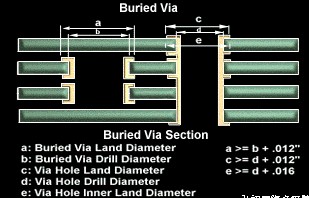HDI Automotive PCB have been widely used in the automotive industry. High-density interconnection (HDI) PCBs may have cross-layer blind vias or double-layer structures.
In order to achieve the high reliability and safety of automotive HDI Automotive PCB, IPCB manufacturers must follow strict strategies and measures, which is the focus of this article.
Automotive PCB type
In automotive circuit boards, traditional single-layer PCBs, double-layer PCBs and multi-layer PCBs can be used. In recent years, the wide application of HDI Automotive PCB has become the first choice for automotive electronic products. There is indeed an essential difference between ordinary HDI PCB and automotive HDI PCB: the former emphasizes practicality and versatility and provides services for consumer electronic products, while the latter focuses on reliability, safety and high quality.
Classification and application of HDI Automotive PCB
HDI Automotive PCB can be divided into single-layer HDI PCB, double-layer build-up PCB and three-layer build-up PCB. Here, the layer refers to the layer of prepreg.
Vehicle-mounted vehicle equipment that can be used independently in the vehicle environment and has nothing to do with vehicle performance includes vehicle information systems or vehicle computers, GPS systems, vehicle video systems, vehicle-mounted communication systems, and Internet device functions. These functions are implemented by equipment supported by HDI Automotive PCB.
The equipment is responsible for signal transmission and a large amount of control.
Requirements for manufacturers of automotive HDI Automotive PCB
Due to the high reliability and safety of automotive HDI printed circuit boards, automotive HDI IPCB manufacturers must meet high-level requirements:
a. Integrated management system and quality management system that play a key role in the management level of automobile HDI IPCB manufacturers. For example, automotive IPCB manufacturers have passed ISO9001 and ISO/IATF16949 certification.
b. HDI IPCB manufacturers must have solid technology and high HDI manufacturing capabilities. Specifically, manufacturers specializing in the manufacture of automotive circuit boards must manufacture circuit boards with a line width/spacing of at least 75μm/75μm and a two-layer structure. It is recognized that HDI PCB manufacturers must have a process capability index (CPK) of at least 1.33 and a device manufacturing capability (CMK) of at least 1.67. Unless approved and confirmed by the customer, no modification shall be made in the future manufacturing.
c. Automotive HDIPCB manufacturers must follow the most stringent rules when selecting PCB raw materials, because they play a key role in determining the reliability and performance of the final PCB.

HDI Automotive PCB
Material requirements for HDI Automotive PCB
•Core board and prepreg. They are the most basic and critical elements for manufacturing automotive HDI PCBs. When it comes to the raw materials of HDI PCB, the core board and prepreg are the main considerations. Generally, HDI core boards and dielectric layers are relatively thin. Therefore, a layer of prepreg is sufficient for use on consumer HDI boards. However, automotive HDI PCBs must rely on the lamination of at least two layers of prepreg, because if cavities or insufficient adhesives occur, a single layer of prepreg may lead to a decrease in insulation resistance. After that, the end result may be a failure of the entire PCB board or product.
• Solder mask. As a protective layer directly covering the surface circuit board, the solder mask also plays the same important role as the core board and prepreg. In addition to protecting the external circuit, the solder mask also plays a vital role in the appearance, quality and reliability of the product. Therefore, the solder mask on the automotive circuit board must meet the most stringent requirements. The solder mask must pass a number of reliability tests, including heat storage test and peel strength test.
Reliability test of automotive HDIPCB materials
Qualified HDI PCB manufacturers will never take material selection for granted. Instead, they must perform some tests on the reliability of the circuit board. The main tests related to the reliability of automotive HDI PCB materials include CAF (conductive anode wire) test, high and low temperature thermal shock test, weather temperature cycle test and heat storage test.
• CAF test. It is used to measure the insulation resistance between two conductors. The test covers many test values, such as the minimum insulation resistance between layers, the minimum insulation resistance between through holes, the minimum insulation resistance between buried holes, the minimum insulation resistance between blind holes, and the minimum insulation between parallel circuits resistance.
• High temperature and low temperature thermal shock test. This test is designed to test the resistance change rate which must be less than a certain percentage. Specifically, the parameters mentioned in the test include the rate of change of resistance between through holes, the rate of change of resistance between buried holes, and the rate of change of resistance between blind holes.
•Climate temperature cycle test. The board under test needs to be pre-processed before reflow soldering. In the temperature range of -40 degree Celsius±3 degree Celsius to 140 degree Celsius±2 degree Celsius, the circuit board must be kept at the lowest temperature and the highest temperature for 15 minutes. As a result, qualified circuit boards will not be laminated, white spots, or exploded.
•High temperature storage test. This test focuses on the reliability of the solder mask, especially its peel strength. As far as the solder mask judgement is concerned, this test is considered the most stringent.
According to the test requirements introduced above, IPCB conducts rigorous tests on HDI Automotive PCB materials